MercoPress. South Atlantic News Agency
Tag: Sea Lion Main Complex
-
Friday, August 16th 2024 - 18:16 UTC
Falklands oil development: update on the consultation on Sea Lion offshore field
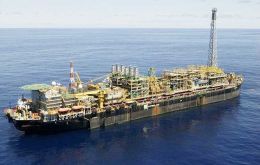
On Tuesday 2 July 2024 it was announced that Navitas Petroleum Development and Production Ltd (Navitas) issued a revised Environmental Impact Statement (EIS) concerning its proposals for the drilling of oil wells and offshore production from the Sea Lion Field Northern Development Area, Phase 1 and 2.
-
Monday, July 29th 2024 - 08:06 UTC
Falklands, controversy with Navitas oil company Environmental Impact Statement
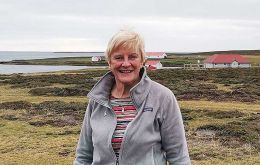
Falklands Conservation has published initial views on the Navitas oil company Environmental Impact Statement (EIS) and encourages people to comment on the report. This is of course welcome but their statement that essential information on key animal groups is missing, is misleading. It states that ‘the presented seabird data is more than 20 years old’.
-
Wednesday, July 3rd 2024 - 20:05 UTC
Falklands, Navitas updates emission assessment of Sea Lion environmental impact statement
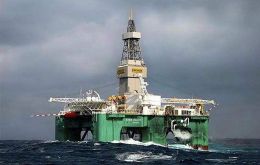
The Israeli/US company preparing to extract oil from Falkland Islands waters, Navitas Petroleum Development and Production Ltd. (Navitas) has issued a revised Environmental Impact Statement (EIS) concerning its proposals for the drilling of oil wells and offshore production from the Sea Lion Field Northern Development Area, Phase 1 and 2, which includes additional information on atmospheric emissions.
-
Thursday, June 20th 2024 - 15:55 UTC
Falklands: Consultation to begin on Sea Lion offshore oil development, north of the Islands

Following an extraordinary sitting of Executive Council on Monday 17 June, the Falkland Islands Government has agreed that there will be a public consultation from Monday 24 June to Monday 5 August 2024, on the Environmental Impact Statement for the Sea Lion Field Northern Development Area, Phase 1 and 2, which has been submitted by Navitas Petroleum Development and Production Limited.
-
Saturday, July 23rd 2022 - 22:49 UTC
Falklands’ black gold rush might at last be a reality

By Dominic O’Connell, The Times- Head north from the Falkland Islands, across the South Atlantic waves where albatross wheels and whales sound, and you pass over what could be a big new oil province — a significant source of hydrocarbons controlled not by sheiks or oligarchs, but by the United Kingdom.
-
Wednesday, April 20th 2022 - 10:05 UTC
Rockhopper and Israel's Navitas as operator, agree to develop Sea Lion project
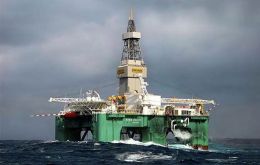
Rockhopper Exploration and Navitas Petroleum have reached an agreement by which the Israeli company becomes the operator of the promising Sea Lion project located north of the Falkland Islands. This lays the basis for a new technical and financing plan for a lower-cost development of the Sea Lion area.
-
Tuesday, October 5th 2021 - 09:20 UTC
Falklands: Rockhopper targets lower costs for Sea Lion project and potential entry of Navitas Petroleum
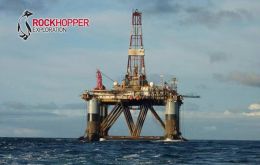
Rockhopper Exploration presented on the last day of September its half-year interim report, which follows on the shock announcement from Harbour Energy that it will seek to exit the Sea Lion Project in the North Falkland Basin.
-
Tuesday, August 18th 2020 - 15:50 UTC
Falkland Islands and oil companies new approach to “stranded assets”

An article in World Oil by Laura Hurst refers to the term “stranded assets” and mentions the case of the Falkland Islands oil industry: the discovery a decade ago of as much as 1,7 billion barrels of crude offshore the British Overseas Territory, and rather than the next frontier, the project to extract energy risks being added to a list of what companies call “stranded assets” that could cost them huge sums to mothball.
-
Friday, May 1st 2020 - 08:27 UTC
Rockhopper, Premier and Navitas LP confirm Falklands' Sea Lion farm-in agreement
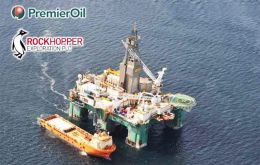
Rockhopper Exploration has provided an update on its previously announced Heads of Terms with Navitas Petroleum LP to farm into the Sea Lion project in the North Falkland Basin.
-
Thursday, April 9th 2020 - 08:45 UTC
Falklands' Sea Lion development delayed responding to oil market conditions
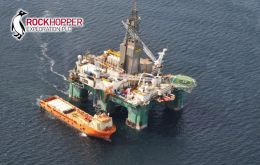
Rockhopper Exploration is responding to market developments by reducing staffing levels and activity related to the Sea Lion development in the offshore North Falkland basin. The company plans to maintain a smaller team, mainly focused on regulatory, fiscal and financial issues, pending a recovery in the external macro-environment.
